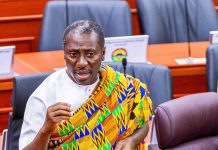Alan Kyerematen, leader of the Movement of Change and independent Presidential candidate for the 2024 General Elections, has officially unveiled an ambitious and comprehensive action plan aimed at transforming Ghana’s socio-economic landscape.
The Plan, dubbed the “Great Transformational Plan (GTP)”, which he announced earlier in the year, is a visionary policy framework that seeks to propel Ghana into a new era of sustainable development, with a tangible impact on people’s lives.
The official launch, held at the Movenpick Hotel on June 24, 2024 was marked by an atmosphere of optimism and drew distinguished leaders and stakeholders from various sectors across Ghana.
PRACTICAL STRATEGY
At the heart of Alan Kyerematen’s GTP is a detailed and practical strategy designed to address Ghana’s most pressing challenges, while capitalising on its unique strengths.
The plan outlines key policy recommendations across several sectors, including industrialisation, agriculture, education, tourism and healthcare, aiming to create a more stable, diversified and resilient economy.

The event was graced by a diverse and distinguished audience, including members of the Alliance for Revolutionary Change, the Movement for Change, Otumfuo’s Manwerehene, Baafuor Dr. Ossei Hyeamann Brantuo VI, members of the diplomatic corps, representatives from sister political parties, captains of industry, faith-based organizations, academia, and civil society.
He looked back to a seminal moment in Ghana’s history—the declaration of independence by Dr. Kwame Nkrumah on March 6, 1957.
“Dr. Kwame Nkrumah heroically declared before an ecstatic crowd at the Old Polo Grounds in Accra that ‘At long last, the battle is ended and Ghana, your beloved country, is free forever.’
Although the expectation at that time was for political freedom, there was a clear desire for Ghana also to become economically independent.”
SOCIO-ECONOMIC CHALLENGES
However, Mr. Kyerematen lamented that, despite the passage of 67 years since independence, Ghana remains plagued by significant socio-economic challenges.
“Regrettably, 67 years after the shackles of colonial domination were dismantled, Ghana, our beloved country, is still unable to feed itself, unable to provide jobs for its young population, unable to provide potable water for at least half of its population, unable to keep our lights on, unable to provide decent housing for the majority of its people.
“We have been compelled for the 17th time to seek a bailout from the International Monetary Fund, although we pride ourselves as one of the leading producers of gold in the world.”
He attributed Ghana’s plight to three primary factors: failed leadership, divisiveness within the political sphere, and unproductive attitudes, behaviors, and mindsets among the populace.
“We are at where we are now because we have brought this upon ourselves,” Mr. Kyerematen stated, underscoring the need for introspection and change.
GREAT TRANSFORMATIONAL PLAN
Mr. Kyerematen then shifted focus to the crux of his address – the Great Transformational Plan (GTP). He described the GTP as a bold and innovative policy framework designed to propel Ghana into a new era of economic prosperity and stability.
“Distinguished ladies and gentlemen, this is why we are here today—to launch the most comprehensive Policy Framework, the GTP, that will move Ghana from instability to stability, to growth, to resilience, and finally to prosperity.”
The GTP, Mr Kyerematen explained, is structured into six interrelated clusters: Economic, Governance, Infrastructure, Social Services, Environment, Science and Technology, and Natural Resource Management, and Behavioral and Mindset Change. Each cluster comprises several pillars, thematic areas, and policy prescriptions or solutions.
Kyerematen detailed the Economic Cluster, which includes four pillars: Macro economy, Industrial Transformation, a New Agricultural Revolution, and Tourism.
On macro economy, he said “We will reduce the current size of Government and run a lean Executive administration, consisting of not more than 40 Ministers.”
He also pledged to eliminate sole sourcing in public procurement to ensure value for money, consolidate government departments with overlapping mandates and reinforce mechanisms to eliminate ghost names from the public sector payroll.
PRIVATE SECTOR FINANCING MODELS
Also, he proposed innovative private sector financing models such as Build Operate and Transfer (BOT), Build Own and Operate (BOO) and Engineering, Procurement, Construction and Financing (EPCF) to reduce government financing of infrastructure projects by at least 60%.
On Industrial transformation, he outlined plans to build an Enterprise Economy, focusing on private enterprise, innovation, and unleashing the entrepreneurial spirit of Ghanaians.
“This is what will take Ghana forward to occupy its rightful place in the comity of nations,” he declared.
On New Agricultural Revolution, Alan Cash as he is popularly known emphasized the need for a modern agricultural sector and proposed policies to boost productivity, ensure food security and create jobs.
“We will implement measures to transform agriculture into a lucrative and sustainable sector that supports the nation’s economy.”
Furthermore, Mr. Kyerematen highlighted tourism as a key pillar for economic growth, with plans to develop and promote Ghana’s rich cultural heritage and natural attractions to attract both local and international tourists.
Mr. Kyerematen stressed the importance of good governance, transparency, and accountability.”We need transformational leadership, a paradigm shift in our governance system, and a mindset change,” he said.
GOVERNMENT OF NATIONAL UNITY
He proposed the establishment of a Government of National Unity, aiming to mobilize the collective strength and talents of all Ghanaians, regardless of political, religious, or ethnic affiliations.
“Both the NDC and NPP have had the opportunity of being in charge of this country for the last thirty-two years. They have exhausted their capabilities and competencies, and ought not to be restored or retained in power,” Mr. Kyerematen argued, criticizing the two dominant political parties for their lack of a concrete plan for Ghana.
The Infrastructure Cluster of the GTP focuses on developing critical infrastructure to support economic growth and improve living standards. Mr. Kyerematen highlighted plans for comprehensive infrastructure development, including transportation, energy, and water supply systems. “We will ensure that every Ghanaian has access to reliable and affordable infrastructure services,” he promised.
Mr. Kyerematen’s plan for social services includes initiatives to improve healthcare, education, and social welfare.
“We will invest in our people by providing quality education and healthcare services to all,” he stated. He emphasised the need for a robust social safety net to protect vulnerable populations and promote social equity.
The GTP also addresses environmental sustainability and the role of science and technology in national development. He proposed policies to promote renewable energy, protect natural resources, and encourage scientific research and innovation.
“Our goal is to build a sustainable future for our children and grandchildren,” he said.
CULTURAL SHIFT
Mr. Kyerematen underscored the importance of a cultural shift towards productivity, integrity and national pride.
“We need to change our attitudes and behaviors to achieve the Ghana we envision,” he stressed. He called for a collective effort to foster a sense of responsibility and civic duty among Ghanaians. He reiterated his commitment to transforming Ghana through the Great Transformational Plan.
“We have an opportunity in the General Elections in December this year to cross that bridge and move Ghana into a new era of peace and prosperity,” he asserted.
He urged Ghanaians to support his candidacy and embrace the GTP as the blueprint for a brighter future.”With the Great Transformational Plan, we will build an Enterprise Economy, unleash the entrepreneurial spirit of Ghanaians and position Ghana as the Black Star of Africa,” Kyerematen proclaimed, leaving the audience with a renewed sense of hope and purpose.









